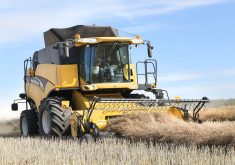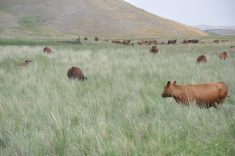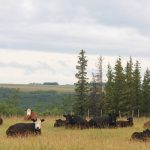A coalition of farm groups is lobbying for a significant increase in federal support for agricultural research investment.
It is led by Grain Growers of Canada, which argues that since Liberal cuts in the mid-1990s, federal support of research has never recovered.
In inflation-adjusted dollars, research funding remains 40 percent below 1994 levels.
At first blush, it would be easy to imagine that a rural-based government like the Conservatives, facing pressure from a farm lobby that supports many of its key policy priorities, will understand the need for more investment in agricultural research. In fact, it extolls the importance of investment in research.
Read Also

Weigum’s work with Alect Seeds earns her Alberta’s Outstanding Young Farmer award
Three Hills farmer earns Alberta’s Outstanding Young Farmers award through marketing of Alect Seeds to bring the best varieties and crop types to their customers and improve the quality of the land they farm.
A budget is coming in February or March and farmers want help.
Surely there will be some recognition of the need for investment in food production into the future.
Surely, last week’s announcement that the Natural Sciences and Engineering Research Council, a key federal funder of research, has dropped agriculture and food as a target area for funding, will draw a government response, perhaps a reversal.
Don’t count on it.
In fact, bet against any significant government investment in agriculture in the winter budget. It will be a restraint budget with few new commitments as the Conservatives work to reduce a record deficit.
Besides, agriculture minister Gerry Ritz seems convinced that focused research spending on industry-identified needs, capable of producing relatively fast results, is a better approach than broader funding of more unfocused basic research.
Politically, there would be little to gain by acceding to the demand for more research spending.
Why would the Conservatives spend money on a sector where voters are guaranteed to vote Tory?
As the future of farming conference was reminded last week, there is nothing unique about a Conservative government with strong rural support refusing to accede to farmer demands for more spending.
Alex McCalla, an eminent American agricultural economist and former World Bank executive who began life as a Canadian prairie farm boy, recalled last week that his first trip to Ottawa in January happened 53 years ago when he joined other prairie farmers to urge the new government to help farmers.
Six months before, prairie lawyer John Diefenbaker had led his Progressive Conservatives to a minority government, ending 22 consecutive years of Liberal government. His base was the rural west. At Ottawa’s Chateau Laurier hotel,
Diefenbaker and his cabinet gathered in 1958 to hear the farmer plea. McCalla spoke for young farmers.
While history records the Diefenbaker government as farmer-friendly, their pleas on that cold January day fell on deaf ears.
Calgarian Doug Harkness was the agriculture minister that day and a comment by his eventual successor may explain the farm lobby failure.
“He was the only person who could make both farmers and city folk mad in the same speech,” said Alvin Hamilton, who replaced Harkness in 1960. “He was against all forms of subsidies to farmers and you don’t say that sort of thing to farmers.”
Actually, some ministers do.














